Posts Tagged: traditional gynaecology
Women’s health & Chinese Medicine

How does Chinese Medicine look after women’s health?
For one, it has always recognised women’s difference, and that there needs to be specialised medicine for them. The earliest known medical texts discuss female anatomy and health, and many of the most important texts have chapters devoted to women’s health. As early as the 2nd century AD there were Chinese doctors who specialised in treating women, and today it is possible find doctors whose family have been doing so for as many as 37 generations. There are even acupuncture points that are used for complaints as specific as lower back pain during a period.
Conventional medicine is coming around to recognising the connection between mental and emotional states and health, but it’s fundamental to Eastern medicines. This is important for looking after everyone’s health, but maybe more so for women who are more likely to recognise and acknowledge their emotional state, than men who have been conditioned to ignore it. So women are often the ones who report an emotional factor to their doctor, and who used to run the risk of being labelled ‘neurotic’.
It’s notable that the Greek root of ‘hysteria’, is the word for uterus.
Chinese Medicine doctors don’t divorce emotional factors from their understanding of a person’s health, and even have a physiology of emotions that explains or predicts health problems. So regulating emotions is often part of treating an illness, and this can be important for women’s health, as they are often quite aware of how their emotions change in tune with their physiology. We have powerful but subtle tools to look after women’s health that we can use for the wide range of conditions that tend to be disregarded by conventional medicine, or treated with valium, the oral contraceptive pill, or surgery.
There’s a lot more we can do than suggest that a woman has a Bex, and a lie down.
A further strength of Chinese Medicine gynaecology is that it offers an understanding of a condition when there is no recognisable ‘organic’ pathology. This is what convention medicine looks for, either a recognisably diseased or damaged tissue, a microscopic pathogen, or a measurable imbalance in biomarkers. It then tends to treat gynaecological conditions with surgery, anti-biotics or anti-virals, or attempts to regulate hormone levels with the pill or an implant such as a Mirena.
Chinese medicine gynaecology offers solutions when there is no identifiable ‘organic’ disease. We use herbs and acupuncture to regulate periods that are too heavy or too light, debilitatingly painful, or are accompanied by back pain, headaches, or distressingly severe mood changes. We take particular care of women who have just had a child: we help them recover from the effort of growing a little human, help them with feeding, and give support during a time that does not always have the shiny happiness of the Insta feed.
There’s a bit more about Chinese Medicine gynaecology here by my mentor, Steven Clavey. He also shows some research covering its treatment of infertility, gynaecological pain, endometriosis, and menopausal symptoms.
The photo’s a bit naff. But apparently people like that sort of thing.
